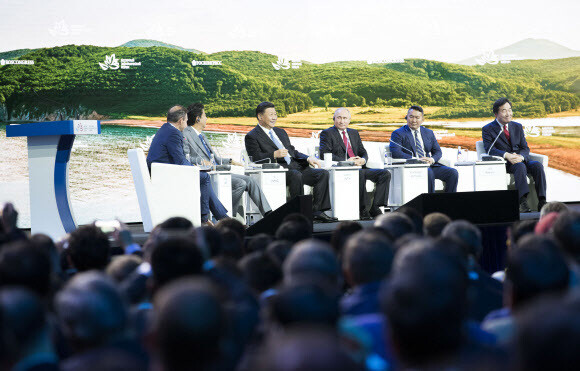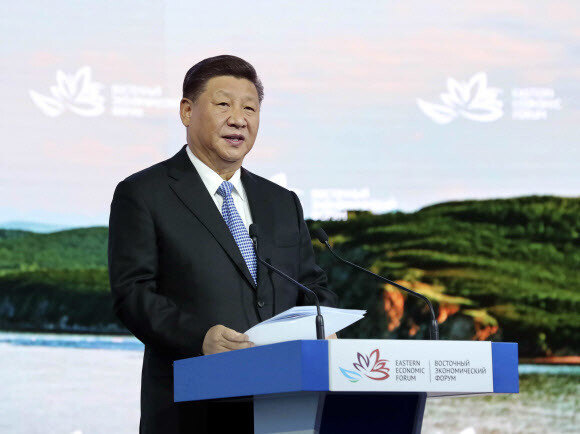hankyoreh
Links to other country sites 다른 나라 사이트 링크
China, Russia and Japan reveal position on inter-Korean affairs at Eastern Economic Forum

The leaders of China, Russia, and Japan shared their thoughts on the current Korean Peninsula situation at the Eastern Economic Forum, which came to a close in Vladivostok on Sept. 13.
Amid the deadlock in North Korea-US negotiations on denuclearization, China opted for a slight concession, while Russia called for resumption of the Six-Party Talks. Japan reiterated its focus on keeping sanctions in place and resolving the issue of Japanese nationals abducted to North Korea.
Speaking at the forum’s general session in Vladivostok on Sept. 12, Chinese President Xi Jinping signaled that he would be willing to tentatively accept a trilateral framework focusing on South and North Korea and the US in building a peace regime on the Korean Peninsula.
Beijing no longer demanding to be direct party in end-of-war declaration
“The countries currently involved are North and South Korea and the US. They must continue [their efforts], and we should cooperate with them,” he said. Taken literally, Xi’s remarks suggest Beijing plans to cooperate as an “interested party” rather than a central presence in the declaration of an end to the Korean War and subsequent transition to a peace regime.
As recently as one month ago, Beijing was stressing its own position as a direct party that could not be left out of the process. National People’s Congress foreign affairs committee chairman Zhang Yesui told a visiting delegation of South Korean National Assembly members on Aug. 16 that China “must be a part of the end-of-war declaration process.”
In mid-July, Central Foreign Affairs Commission deputy director and politburo member Yang Jiechi – seen as the “control tower” for Chinese diplomacy – paid a top-secret visit to South Korea to discuss the issue with Blue House National Security Office director Chung Eui-yong.
But Xi now appears to be backing off after US President Donald Trump halted dialogue with North Korea, naming Beijing as a “stumbling block” to denuclearization talks. His message about China remaining in a “cooperative” role on Sept. 12 came after a previous decision to send National People’s Congress standing committee chairman Li Zhanshu – the third-ranking figure in the Chinese Communist Party hierarchy – in his stead to attend a Sept. 9 event celebrating the 70th anniversary of North Korea’s government.
“If things are in a state where they’re talking about North Korea-China relations involving ‘close cooperation and collaboration within a single general staff’ [as North Korean leader Kim Jong-un said during his third China visit on June 19], China may not feel the need to take part in an end-of-war declaration [for the time being],” said Sungkyunkwan University Sungkyun Institute of China Studies director Lee Hee-ok on the shift in Beijing’s position.
“It wouldn’t be a problem if they got on board with a peace agreement and peace regime once the hurdles have been cleared with the denuclearization talks,” Lee suggested.

Russian President Vladimir Putin stressed the need for multilateral meetings to supplement the North Korea-US talks.
“If North Korea is content with US [security] guarantees alone, we’re fine with that, but I don’t think that will happen. We need to be realistic,” he said.
“The international community could offer security guarantees to North Korea through participation by the nuclear powers,” he suggested.
At the same time, Putin noted that North Korea “has taken some measures related to denuclearization, including the dismantlement of its nuclear test site.”
“And it appears to be waiting for something corresponding to that – at least some kind of a signal,” he added.
Putin’s reference to a “signal” was interpreted as meaning partial lifting of economic sanctions against North Korea or the US’s agreement to an end-of-war declaration. Indeed, China and Russia previous proposed a press statement on “beginning discussions toward easing North Korean sanctions” to the UN Security Council in late June, although the plan ended up falling through after objections from the US and others. Russia’s TASS news agency suggested the “multilateral meetings” mentioned by Putin were a reference to the Six-Party Talks on the nuclear issue.
Japanese Prime Minister Shinzo Abe reiterated his stance that the UNSC sanctions must be thoroughly enforced and the nuclear, missile, and abduction issues resolved before the complete denuclearization of the Korean Peninsula is achieved. On the question of a North Korea-Japan summit – a focus of widespread attention – Abe said, “Nothing has been decided, but if we do have a summit, it must be one that helps in resolving the abductee issue.”
By Kim Oi-hyun, Beijing correspondent, and Kim Ji-eun, staff reporter
Please direct comments or questions to [english@hani.co.kr]

Editorial・opinion
![[Column] Season 2 of special prosecutor probe may be coming to Korea soon [Column] Season 2 of special prosecutor probe may be coming to Korea soon](https://flexible.img.hani.co.kr/flexible/normal/500/300/imgdb/original/2024/0426/3317141030699447.jpg) [Column] Season 2 of special prosecutor probe may be coming to Korea soon
[Column] Season 2 of special prosecutor probe may be coming to Korea soon![[Column] Park Geun-hye déjà vu in Yoon Suk-yeol [Column] Park Geun-hye déjà vu in Yoon Suk-yeol](https://flexible.img.hani.co.kr/flexible/normal/500/300/imgdb/original/2024/0424/651713945113788.jpg) [Column] Park Geun-hye déjà vu in Yoon Suk-yeol
[Column] Park Geun-hye déjà vu in Yoon Suk-yeol- [Editorial] New weight of N. Korea’s nuclear threats makes dialogue all the more urgent
- [Guest essay] The real reason Korea’s new right wants to dub Rhee a founding father
- [Column] ‘Choson’: Is it time we start referring to N. Korea in its own terms?
- [Editorial] Japan’s rewriting of history with Korea has gone too far
- [Column] The president’s questionable capacity for dialogue
- [Column] Are chaebol firms just pizza pies for families to divvy up as they please?
- [Column] Has Korea, too, crossed the Rubicon on China?
- [Correspondent’s column] In Japan’s alliance with US, echoes of its past alliances with UK
Most viewed articles
- 1[Column] Season 2 of special prosecutor probe may be coming to Korea soon
- 2‘We must say no’: Seoul defense chief on Korean, USFK involvement in hypothetical Taiwan crisis
- 3Is N. Korea threatening to test nukes in response to possible new US-led sanctions body?
- 4Amnesty notes ‘erosion’ of freedom of expression in Korea in annual human rights report
- 5Division commander ordered troops to enter raging flood waters before Marine died, survivor says
- 6N. Korean delegation’s trip to Iran shows how Pyongyang is leveraging ties with Moscow
- 7[Editorial] Korea’s surprise Q1 growth requires objective assessment, not blind fanfare
- 8Is Japan about to snatch control of Line messenger from Korea’s Naver?
- 9No good, very bad game for Korea puts it out of Olympics for first time since 1988
- 10[Reportage] On US campuses, student risk arrest as they call for divestment from Israel